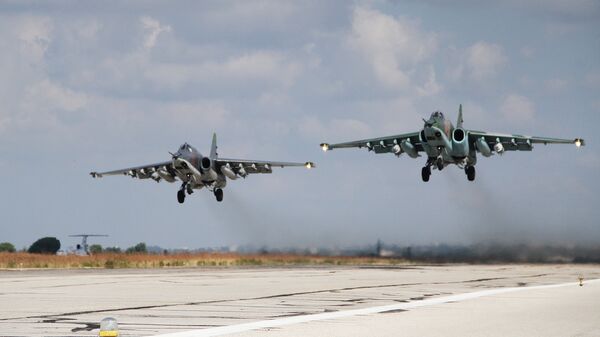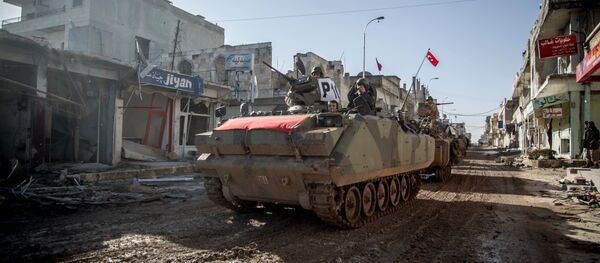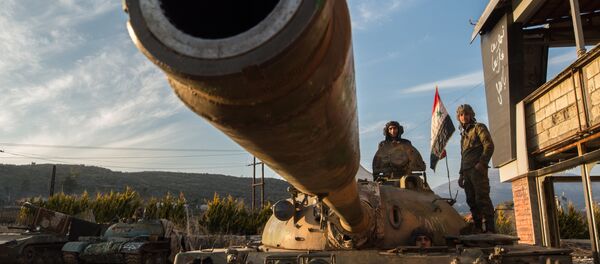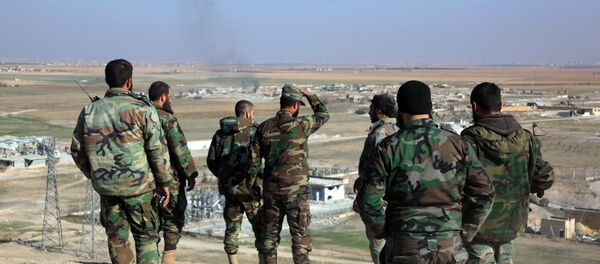The Russo-Syrian advance is gaining momentum in Syria: in the past few weeks the Syrian Arab Army (SAA), supported by Russia's Air Force, has recaptured strategic areas in Latakia, Idlib, Daraa, Homs and Aleppo, cutting off supply lines of the Islamists.
The situation on the ground has prompted a heated debate among analysts over the future of the Syrian statehood.
#SYRIA #FOOTAGE Aviation strike eliminated militants' strong point in the #Latakia province https://t.co/tCV6GVFTXGhttps://t.co/Kl6qMxnFm0
— Минобороны России (@mod_russia) 11 февраля 2016
In his recent op-ed for The Huffington Post, former British intelligence (MI6) official Alastair Crooke noted that there are no signs that Damascus and Moscow are heading toward an exhausting quagmire. Instead, the allies are facing "a clear military outcome." According to Crooke, Russo-Syrian forces are likely to win over Daesh and other Islamic extremists in the region. He also downplayed prognoses of a possible low-intensity guerrilla war in the aftermath of the Russo-Syrian victory. The former MI6 official underscored that radical Islamists enjoy little if any public support in Syria.
#SYRIA Units of Syrian opposition are sharing recon. data quite effectively. Most of them are cooperating with Syrian government
— Минобороны России (@mod_russia) 11 февраля 2016
"The Turkish army would not set foot on Syrian soil without a UN Security Council resolution," Hurriyet Daily reported Wednesday, citing the Turkish General Staff officials.
#SYRIA All political issues must be resolved only by Syrians with international mediation. Not in trenches, but at negotiating table
— Минобороны России (@mod_russia) 11 февраля 2016
In light of this, the question arises, what do the continued Geneva talks have in store for Syria?
"The shaping of post-conflict political landscapes invariably falls to the victor — not the vanquished. And right now, Geneva looks to be the place where this may happen, under the watch of many of the states that once threw their weight — weapons, money, training, support — behind the Syrian 'opposition'," Sharmine Narwani, a commentator and analyst of Middle East geopolitics, writes in her article for RT.
"So here's a question: As the military landscape inside Syria continues to move in the government's favor, will a final deal look very much different than the 2011 reforms package offered by Syrian President Bashar al-Assad?" she asks.
Although the Assad government pushed ahead with constitutional reforms and called for a nationally held referendum, the so-called Syrian opposition sought a boycott; Western leaders in their turn denounced the referendum as a "cynical ploy."
Then US Secretary of State Hillary Clinton "threw her significant weight behind the unelected, unrepresentative, Muslim Brotherhood-dominated Syrian National Council (SNC)."
"We do view the Syrian National Council as a leading legitimate representative of Syrians seeking peaceful democratic change," Clinton said in an official statement as quoted by Narwani.
In the course of the Syrian civil war hundreds of thousands have been murdered or displaced.
Now, when the Russo-Syrian advance has swung the balance in Damascus' favor, "the participants of [the Geneva talks] are going to have to make some awkward commitments."
"Firstly, the batch of Islamists-for-hire that currently makes up the opposition will need to be finessed — or torn apart — to include a broad swathe of Syrian ethnic groups, sects, political viewpoints and… women," the analyst notes, adding that in the next move, all parties need to agree what militants in the Syrian theatre should be included in the "terrorist list."
Once the country's sovereignty is restored Syria needs to have those 2011 reforms back on the table, she stresses.
"Perhaps Geneva can bring those reforms back, wrapped in a prettier package this time, so we can clap our hands and declare ourselves satisfied," Narwani concludes.






